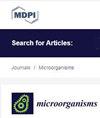硫酸盐还原细菌通过 PI3K/Akt 通路以 TLR 2 依赖性方式诱导促炎性 TNF-α 和 iNOS
IF 4.1
2区 生物学
Q2 MICROBIOLOGY
引用次数: 0
摘要
脱硫弧菌是一种常驻肠道的硫酸盐还原菌(SRB),被发现在炎症性肠病和帕金森病等疾病中过度生长。它们会激活一种促炎症反应,这表明脱硫弧菌可能在炎症中起着因果作用。I 类磷酸肌醇 3- 激酶(PI3K)/蛋白激酶 B(AKT)信号通路调节着炎症感染反应中的关键事件。PI3K/Akt 信号传导功能失调与多种疾病有关。细菌诱导的 PI3K/Akt 通路可能在收费样受体(TLR)信号传导的下游被激活。在此,我们测试了这样一个假设:脱硫弧菌(Desulfovibrio vulgaris,DSV)可通过 PI3K/Akt 以 TLR 2 依赖性方式诱导肿瘤坏死因子α(TNF-α)和诱导型一氧化氮合酶(iNOS)的表达。用 DSV 感染 RAW 264.7 巨噬细胞,并测量 p-Akt、p-p70S6K、p-NF-κB、p-IkB、TNF-α 和 iNOS 的蛋白表达。我们发现,DSV 以时间依赖性的方式诱导这些蛋白。热杀死的和活的 DSV,而不是细菌培养上清液或益生菌植物乳杆菌,都能显著引起 PI3K/AKT/TNF/iNOS 激活。PI3K/AKT信号抑制剂LY294002和TLR 2拮抗剂TL2-C29抑制了DSV诱导的PI3K/AKT通路。因此,DSV 通过 PI3K/Akt 通路以 TLR 2 依赖性方式诱导促炎性 TNF-α 和 iNOS。综上所述,我们的研究发现了一种新的机制,即脱硫弧菌等SRB可能会在与SRB过度生长相关的疾病中引发炎症。本文章由计算机程序翻译,如有差异,请以英文原文为准。
Sulfate-Reducing Bacteria Induce Pro-Inflammatory TNF-α and iNOS via PI3K/Akt Pathway in a TLR 2-Dependent Manner
Desulfovibrio, resident gut sulfate-reducing bacteria (SRB), are found to overgrow in diseases such as inflammatory bowel disease and Parkinson’s disease. They activate a pro-inflammatory response, suggesting that Desulfovibrio may play a causal role in inflammation. Class I phosphoinositide 3-kinase (PI3K)/protein kinase B (AKT) signaling pathway regulates key events in the inflammatory response to infection. Dysfunctional PI3K/Akt signaling is linked to numerous diseases. Bacterial-induced PI3K/Akt pathway may be activated downstream of toll-like receptor (TLR) signaling. Here, we tested the hypothesis that Desulfovibrio vulgaris (DSV) may induce tumor necrosis factor alpha (TNF-α) and inducible nitric oxide synthase (iNOS) expression via PI3K/Akt in a TLR 2-dependent manner. RAW 264.7 macrophages were infected with DSV, and protein expression of p-Akt, p-p70S6K, p-NF-κB, p-IkB, TNF-α, and iNOS was measured. We found that DSV induced these proteins in a time-dependent manner. Heat-killed and live DSV, but not bacterial culture supernatant or a probiotic Lactobacillus plantarum, significantly caused PI3K/AKT/TNF/iNOS activation. LY294002, a PI3K/Akt signaling inhibitor, and TL2-C29, a TLR 2 antagonist, inhibited DSV-induced PI3K/AKT pathway. Thus, DSV induces pro-inflammatory TNF-α and iNOS via PI3K/Akt pathway in a TLR 2-dependent manner. Taken together, our study identifies a novel mechanism by which SRB such as Desulfovibrio may trigger inflammation in diseases associated with SRB overgrowth.
求助全文
通过发布文献求助,成功后即可免费获取论文全文。
去求助
来源期刊

Microorganisms
Medicine-Microbiology (medical)
CiteScore
7.40
自引率
6.70%
发文量
2168
审稿时长
20.03 days
期刊介绍:
Microorganisms (ISSN 2076-2607) is an international, peer-reviewed open access journal which provides an advanced forum for studies related to prokaryotic and eukaryotic microorganisms, viruses and prions. It publishes reviews, research papers and communications. Our aim is to encourage scientists to publish their experimental and theoretical results in as much detail as possible. There is no restriction on the length of the papers. The full experimental details must be provided so that the results can be reproduced. Electronic files and software regarding the full details of the calculation or experimental procedure, if unable to be published in a normal way, can be deposited as supplementary electronic material.
 求助内容:
求助内容: 应助结果提醒方式:
应助结果提醒方式:


